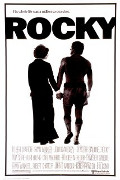
Directed by
John G. Avildsen
119 minutes
Rated M
Reviewed by
Bernard Hemingway

Rocky
One of the most iconic film of the 1970s, if not of all time, Rocky is more significant as a cultural artefact than as a film, despite the fact that it won the 1977 Best Picture Oscar and Stallone was nominated for Best Original Screenplay and Best Actor, putting him in the same company as Charles Chaplin and Orson Welles, the only other people to have received these two nominations for a single film. It produced 5 sequels, all written by and starring Stallone, of which only the final instalment, 2006’s Rocky Balboa, came close to emulating the critical success of the original film.
Stallone plays Rocky Balboa, a dumb-as pug who works as a collector for a loan shark. He's keen on Adrian (Talia Shire), the sister of his slovenly abattoir-worker friend, Paulie (Burt Young). One day the reigning World Heavyweight Champion, Apollo Creed (Carl Weathers), decides that he needs some kind of ordinary Joe symbol to fight and he picks Rocky, who was once known as the “Italian Stallion” before he let himself go to seed. Creed says that he will take Rocky down in the third round but Rocky is determined to go the full fifteen.
Although it only had a relatively small budget of about $1 million, Rocky is actually quite well made with consistently watchable performances, aside from the phlegmatic Stallone, including memorable supports from Burgess Meredith and Young, a convincing sense of setting, at least with respect to Rocky’s South Philly home, Avildsen’s seamless direction and Bill Conti’s stirring score all working together to deliver a well-turned escapist entertainment (most of these elements are combined in the training montage that culminates with Rocky arms skyward in triumph on the steps of the Philadelphia Art Museum as "Gonna Fly Now" thunders away).
Although the climactic boxing match, choreographed by Stallone, is convincingly staged Rocky is less a film about boxing than it is a feel-good story of, if not exactly redemption, then recognition, with Stallone’s Rocky being much the same hero figure as Jimmy Stewart and Gary Cooper were in Frank Capra’s sentimental odes to simple American virtues, Mr Smith Goes To Washington and Mr Deeds Goes To Town.
Want something different?





